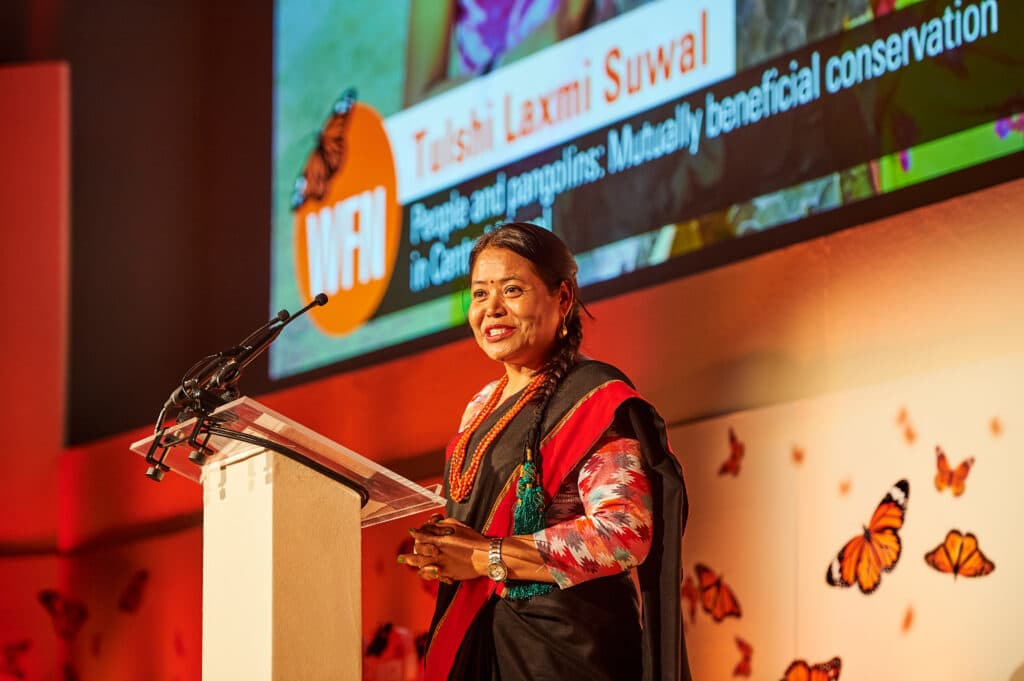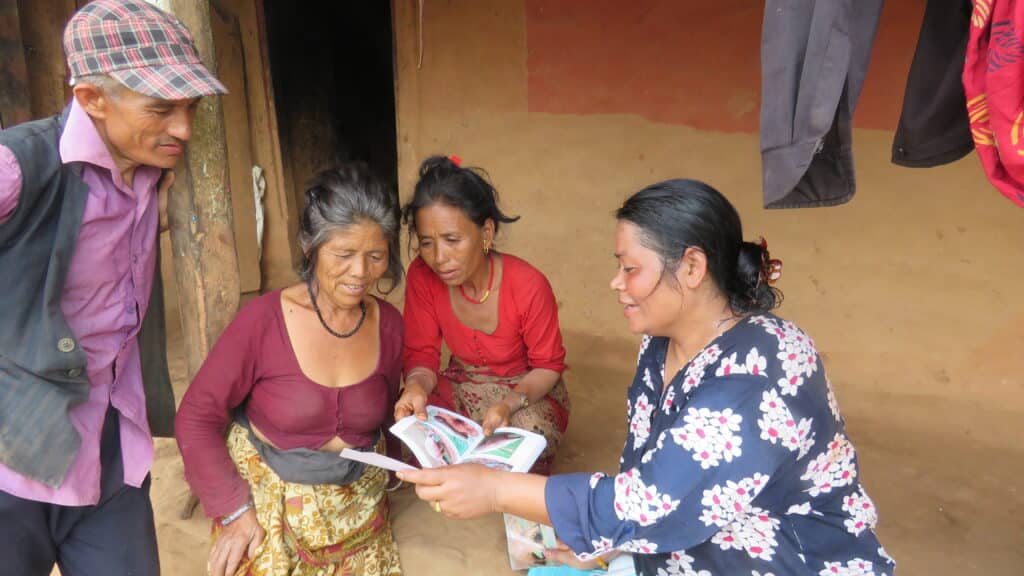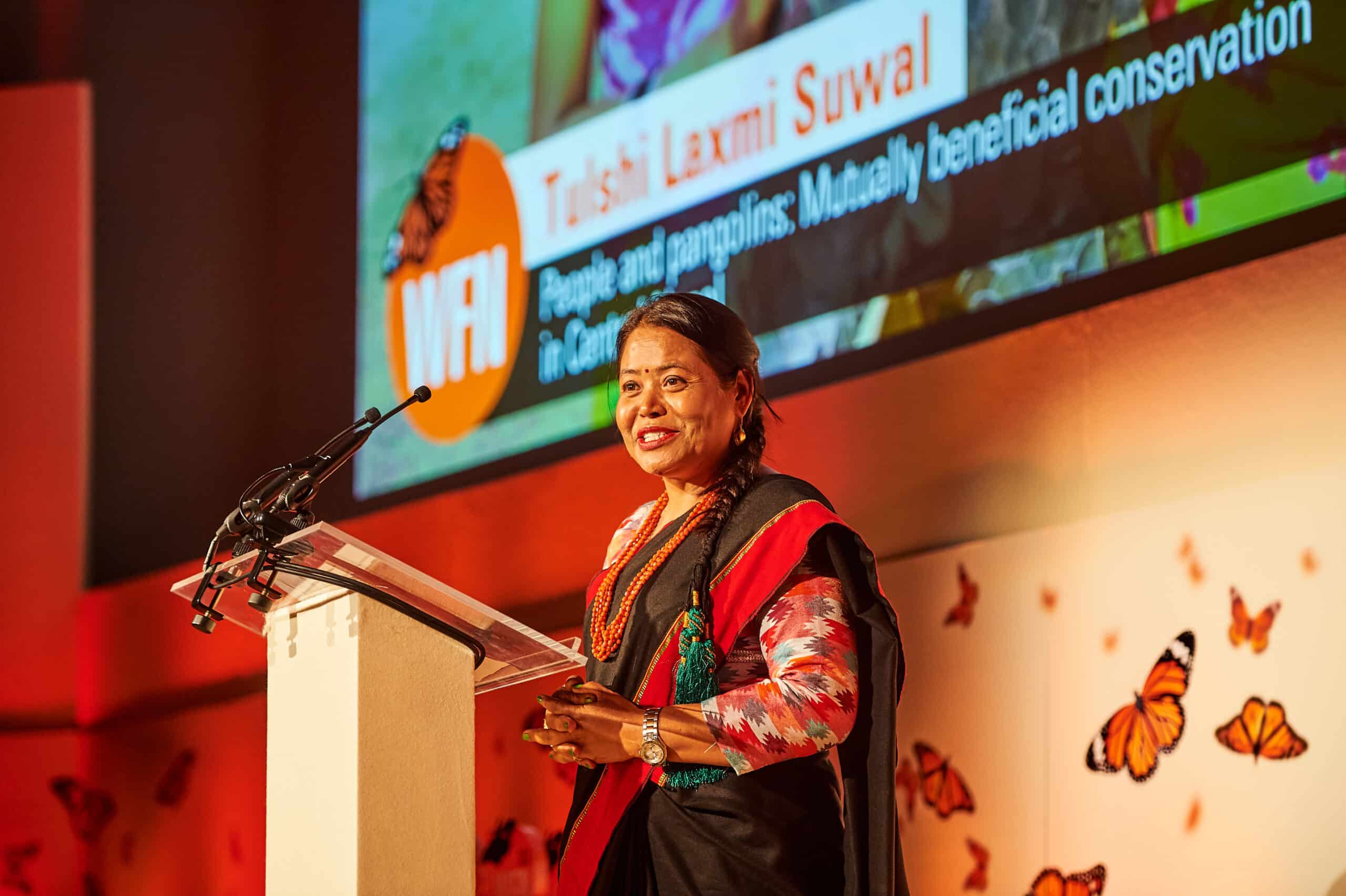Welcome to a special edition of “Meet the Optimists”, featuring winners of the 2023 Whitley Awards. Hear inspiring stories and advice directly from these incredible conservationists, and download Kids’ Corner resources relating to their work too!
Dr. Tulshi Laxmi Suwal is the co-founder of the Small Mammals Conservation and Research Foundation (SMCRF), a non-profit NGO based in Nepal. She is the recipient of a 2023 Whitley Award from the Whitley Fund for Nature. For the last 15 years, she has worked toward the conservation of highly threatened pangolins in Nepal.

Dr. Tulshi Laxmi Suwal at the Whitley Awards Ceremony. [Photo by Gabriel Bush, provided by Whitley Fund for Nature]
In 2007, when I was working towards my master’s degree, I saw an amazing picture of a pangolin in an encyclopaedia for the first time. In Nepal, I saw pangolin body parts being sold openly in the capital city, Kathmandu, even though it has been protected since 1973 in our country along with large mammals such as the tiger, rhino, elephant, and snow leopard. Several seizure cases of this threatened species drove me towards working for their conservation.
Currently, I am working for pangolins and people (living around the species) for their sustainable conservation through threat mitigation, capacity building, awareness campaigns, and livelihood support.
Tell us about a challenge that you faced, and how you overcame it.
The major challenges that I faced are financial support, lack of skilled manpower and equipment as well as fundamental research. To overcome these challenges, I am raising small funds in collaboration with the government and non-government conservation bodies, continuing voluntary efforts and providing training to University students and communities. Now, the ‘Whitley Award 2023’ from the Whitley Fund for Nature has provided large technical and financial support.
What was a key moment in your conservation career? Describe it as vividly as possible.
One key moment in my conservation career goes back 15 years, when I started researching pangolins and very few people knew about them, their ecology and conservation. I have kept my work going through conservation awareness programs, community empowerment, rescuing the confiscated pangolins, and releasing them into a safe natural habitat. Thus, people started to appreciate me who had initially discouraged and doubted doing research on a highly neglected species.

[Photo by Whitley Fund for Nature]
As a married woman in the context of a developing country with a conservative society, continuing my education and following my passion is almost impossible. However, I am lucky to have a supportive family and husband. I was recognized with a 2023 Whitley Award from the Whitley Fund for Nature. It is a true encouragement, support and appreciation of my 15 years of contribution in conservation which is vividly a key moment in my career. Therefore, many young girls are now more inspired by me and want to make their career in conservation.
What is your vision for the future?
The critically endangered Chinese pangolin and Endangered Indian pangolin occur in Nepal. They are mostly distributed in the human-dominated landscapes outside the Protected Areas across the country. The species are threatened by illegal hunting and poaching along with habitat loss due to lack of awareness about the species, its ecological importance and need of their conservation. Therefore, it is necessary to conduct nation-wide awareness campaigns to protect the species and its habitat.
Wildlife conservation is not successful without participation and support of local communities. Community-led conservation with capacity-building trainings and alternative livelihood support programs are utmost required for sustainable conservation of species and people. Motivated local communities will be the stewards for nature conservation including pangolins.
A total of 50 live confiscated pangolins have been rescued from different parts of the country between 2008 and 2020. Due to lack of rehabilitation and captive facilities, they are directly being released back into forests without any medical check up and treatment which increase the risk of death in the wild. Due to declines in population and nocturnal behaviour, pangolin are rarer to observe in the wild. Thus, a ‘Pangolin Rescue and Rehabilitation Center’ and/or ‘Pangolin Sanctuary’ needs to be established for education, eco-tourism and to increase the species population.
What keeps you optimistic about the future of nature?
Nepal is diverse in biodiversity, culture and communities. Our country has already set an example of nature conservation by increasing the population of tigers and zero poaching of one horn rhinos. Regarding the pangolins, a “Pangolin Conservation Action Plan” and “Pangolin National Monitoring Guidelines” have been developed in the country. Government and people have started to prioritise these species conservation. Currently, the Bagmati provincial government provided around 50,000 USD for 15 Division Forest offices for the pangolin habitat management and outreach program. It is the very first time the Nepal government secured its budget for this small-sized mammal. Local stakeholders and communities are leading the conservation outreach program and raising awareness about species and their importance on the occasion of the ‘World Pangolin Day’ in their areas.
Over 50 university students have conducted research on pangolins after me, and there are over 25 published articles about pangolins in Nepal. Recently, we received 80 undergraduate applicants to volunteer for awareness campaigns where we just called for 20. Most of them (75%) were girls!
What is the “pearl of wisdom” that you would hand on to a budding conservationist?
Conservation is difficult to understand, and it is more difficult to make others understand.
Conservation is a very slow process, so it needs continuous efforts over many decades. Thus, conservationists must be patient and ready to volunteer as well as work for a long time for impactful and sustainable conservation.
Never expect to be wealthy, if you are a true conservationist, because conservation is neither a profitable business nor a place where you can bribe.


